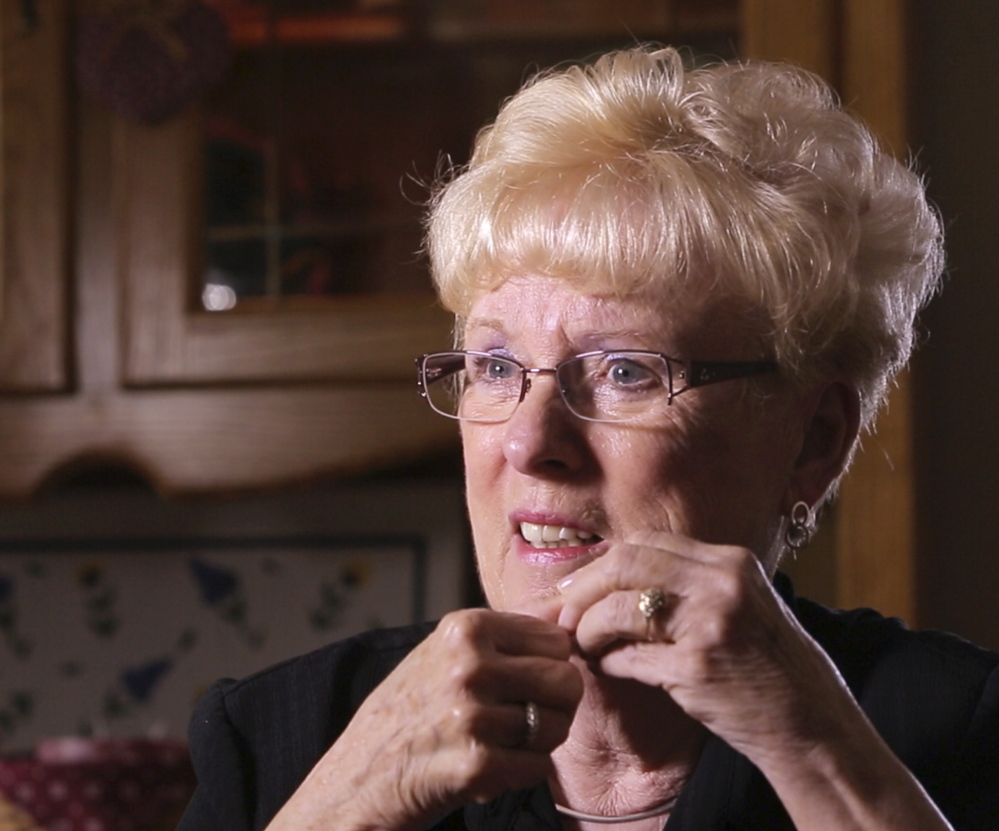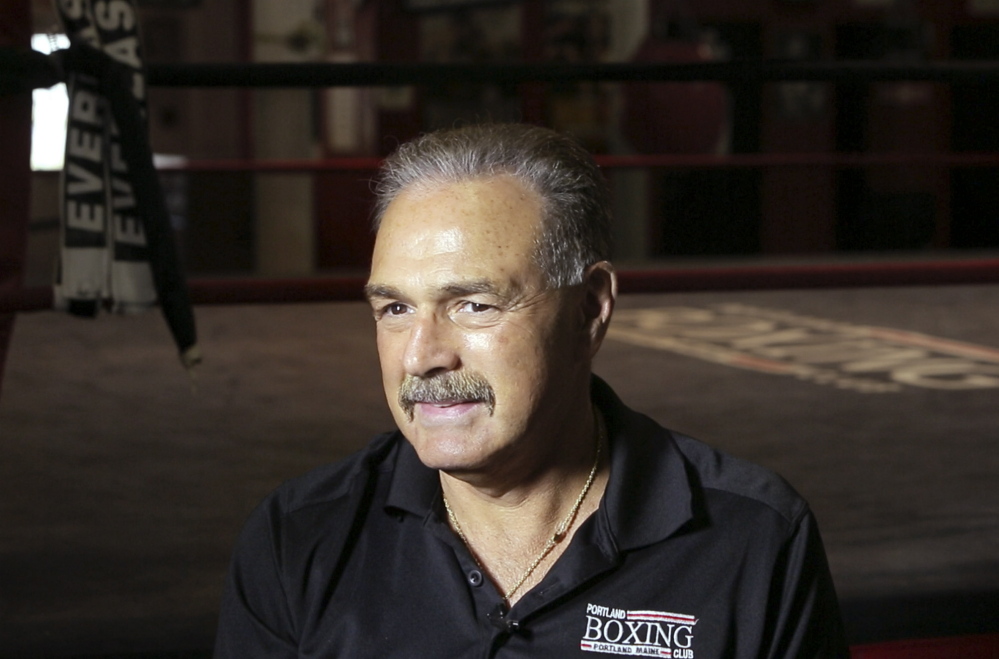Portland filmmaker Gary Robinov was handed a challenge this spring: Create a documentary about a 50-year-old boxing match and its continued resonance in Lewiston.
He went to work, with a $20,000 operating budget and eight weeks to deliver a 27-minute product to the Maine Public Broadcasting Network. He knocked out 15 interviews over the course of three days, combed through video and still photographs, and wound up with “Raising Ali: A Lewiston Story.”
It will be shown on MPBN at 9 p.m. Monday, the anniversary of the Muhammad Ali-Sonny Liston fight. It will also be screened starting at 7:30 p.m. Monday at the Androscoggin Bank Colisee, where the match was held. Tickets are $10 or $12 for that two-hour event.
“It’s a love letter to Lewiston,” Robinov said. “Obviously, it’s about the fight, but it’s so much more than just a historical look back into 1965. It’s really kind of a look at memory and collective memory and identity and what happens over time. How do those things kind of shift over time? Because for a lot of people in 1965, this was a huge identifier for Lewiston. They’ll tell you it put us on the map. And then Lewiston’s obviously gone through some pretty serious changes in the last 50 years, so it’s really about where Lewiston was in 1965 and where Lewiston is today.”
The project was the brainchild of Lewiston native Charlie Hewitt, an artist who serves as executive producer. Hewitt was captivated by the image of Ali standing over Liston after knocking him out in the first round of the heavyweight title fight.
“We came up with the title ‘Raising Ali’ because one of his thoughts was, wouldn’t it be great to take that metaphor and literally put a 20-foot-tall bronze (sculpture) of Ali in that famous pose down by the Colisee,” Robinov said. “And remind people that not only did that fight take place here, but as a reminder that you can always get up and fight.”
The documentary is scheduled for rebroadcast on MPBN at noon Tuesday, 10 p.m. Thursday, and 1 a.m. Friday.
• • • • •
There was no way Sandra Fox was going to miss the biggest thing to ever hit her hometown. The 21-year-old office worker at the Lewiston Coca-Cola plant quickly volunteered to peddle soda at the Ali-Liston fight, just wanting to be part of the spectacle, even if it meant working for free.
She wasn’t a boxing fan, but she was certainly fascinated by Ali, two years her senior.
“He was a good-looking man, I know that,” Fox said. “I thought he was exciting. He was new, and I’d seen him before on television and stuff. I took a liking to him.”
Fox didn’t see Ali’s sudden triumph, though. She was busy selling Coke to the crowd right up until she heard Robert Goulet singing the national anthem. That was her cue, and she asked a couple of co-workers to lift her onto a table so that she could see the ring.
“I had heard the bell to start it when they were helping me up on the table, and when I turned around, Sonny Liston was flat on his back on the mat,” Fox said. “People were not seated yet. And it just began so quickly and ended so quickly. We just watched people mingle around. They still stayed there like they couldn’t believe it was over with. It just shocked everybody that it happened so quick.”
• • • • •
Ali and Liston weren’t the main draws that night for Dick Whitmore. The Bowdoin College senior who grew up outside Boston was a huge fan of former heavyweight champion Rocky Marciano, from nearby Brockton. Marciano was one of many legendary boxers who attended the fight in Lewiston.
“I would bet that 30 percent of the reason I went was to see Rocky,” said Whitmore, a star basketball player at Bowdoin who went on to coach at Colby College for four decades.
Whitmore got one of the $25 cheap seats and settled in near the top of St. Dominic’s Arena, eager to see what a heavyweight title fight was all about. He’s still not sure.
“It was just confusion. You just didn’t know what was going on. You couldn’t figure it out,” Whitmore said of the first-round knockout of Liston. “People started going up to the ring. You could kind of see, but you were seeing a lot of backs of people who were in the ring or just outside the ring; you weren’t seeing what was going on in the middle of the ring. I was thinking, ‘This is all there is to it?'”
Whitmore lingered long after the fight ended, watching the commotion.
“How can you have a bigger event in Maine?” he said. “It’s one of a kind. It was just surreal.”
• • • • •
Bobby Russo finally parted with the gloves, certainly the most coveted memento from that night 50 years ago. Russo, now president of the Portland Boxing Club, attended the Ali-Liston fight as a 9-year-old, thanks to his uncle George, who was chairman of the Maine Boxing Commission.
George Russo ended up with the gloves that both boxers wore that night after they were seized and inspected for signs of possible foul play. They were never reclaimed, so when George died in 1975, he left them to Bobby, by then a boxing enthusiast. In 1995, Ali returned for the 30th anniversary of the fight and signed his gloves, which were slightly smaller than Liston’s.
For years, Russo had the gloves hanging on a nail in a lower-level room in his home.
“Memorabilia wasn’t really memorabilia back then,” he said. “Everyone put their hands in them and they were punching each other. I didn’t realize.”
About the time Ali signed the gloves, Russo came across a story that said a pair that the champion wore in a much less-heralded fight had sold for around $300,000.
“I was like, ‘Whoa.’ Because what could these be worth? Because it was such a controversial fight and then the iconic picture (by Neil Leifer), that’s what makes it so famous. Because you put the gloves with that picture,” Russo said.
Russo sold the gloves a few years ago to a collector in California. He won’t say for how much. But they were auctioned off in New York in February and fetched $956,000.
“I’m happy that my uncle was involved and my whole family saw the fight and that we’re talking about it 50 years later. It’s amazing how it influenced my life,” said Russo, then and now a big Ali fan.
The gloves may be gone, but Russo still has another token from that night – his ticket stub.
• • • • •
Fred Hall was so excited about the heavyweight title fight coming to his town that he went to see both boxers at their hotels.
First up was Sonny Liston, who was sparring at the Poland Spring House.
“To me, he looked about as mean a person as you could ever imagine, just the way he was built. His eyeballs were all red. He just had a sinister look to him,” said Hall, 78.
Next he drove to the Holiday Inn in Auburn, where Muhammad Ali was greeting a crowd of fans from the balcony.
“He looked like a trophy, he was such a handsome guy,” Hall said.
There was no question whom he was rooting for when his wife bought him a $25 ticket as an early Father’s Day gift. Hall didn’t exactly get her money’s worth.
He was standing near the back of the crowd as the fight started. Seeing an open spot near the press box, he turned to make his way over for a better view.
“I heard the crowd just go, it was a scream almost like a stunning shock, whatever that noise was,” Hall said. “No one knew what the hell happened. Fifty years later, everyone says it was great to be there.”
Send questions/comments to the editors.



